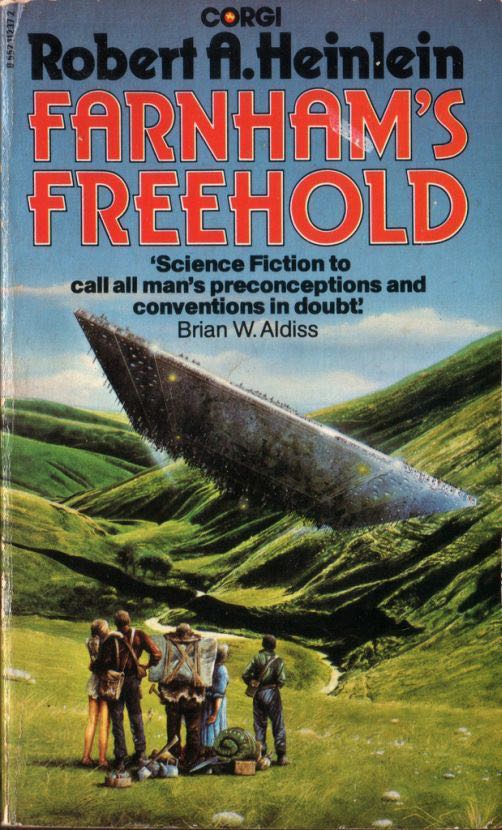Farnham's Freehold
Reviewed date: 2007 Mar 14
Rating: 4
320 pages
At the height of the Cold War, missiles fly. One Colorado family rides out the nuclear armageddon in their bomb shelter. When the worst is over, they emerge to find not a bombed-out city, but virgin forest. A direct bomb hit has apparently thrown them thousands of years into the future, where mankind is extinct.
The survivors are:
- Hugh Farnham, the paranoid citizen who built the bomb shelter to the derision of family and friends. Hugh is the prototypical Heinleinian hero, and is best described as an immature Lazarus Long. Hugh holds to the principles of libertarian freedom, but is willing to sacrifice himself for his family even when they violate those rights. He has a streak of human compassion which Heinlein's heros too often lack.
- Grace Farnham, Hugh's fat, lazy, spoiled wife. She is the antithesis of Hugh. An alcoholic before the nuclear war, she is unable to cope with their new life when Hugh's limited supply of Scotch runs out.
- Duke Farnham, their son, who has an unhealthy fixation on his mother. Unlike his father, Duke is irresponsible and racist.
- Karen Farnham, their daughter, who displays some racist attitudes but not to the degree of Duke or even of her mother Grace.
- Barbara Wells, Karen's friend from college. Barbara is the perfect Heinleinian woman, and it's no surprise that she marries Hugh when Grace divorces him.
- Joseph, the Farnhams' houseboy. Joe adapts better than most to their new life, particularly because Hugh forces everyone to treat him as an equal, not a servant. Joe's character is underdeveloped, but it is revealed that when he has the chance to be master and hold the others as servants, he relishes the opportunity to turn the tables--although he does act with more moderation than one might expect given the abuse heaped upon him by Grace and Duke.
As the family works to carve out a life for themselves, the growing rift between Hugh and Grace threatens to tear them apart. Then they discover the world is not uninhabited. The Farnhams are captured by a party of the Chosen, who inform them that they've been living illegally on a reservation. Everyone but Joe is enslaved; Joe, being black, is a member of the privileged Chosen race.
Grace and Duke ingratiate themselves with their master, and enjoy their lives as pampered pets. Joe also finds himself at home as a privileged man and an entrepreneur in their new society. Hugh and Barbara, unwilling to live as slaves, determine to escape or die trying.
Farnham's Freehold is not as highly regarded as some of Heinlein's other works, but I find it excellent. One often cited objection is that the characters are unlikable, with Hugh in particular being portrayed as an overbearing bully. In fact, Hugh only acts that way in the early days after the war, when the survival of the group depends on it: without his autocratic leadership, the group would have perished. When they are no longer in danger, Hugh does not interfere in their lives.
Hugh has faults, though. He is both more and less faithful (in various ways) to his wife than he should be. He favors his son occasionally, and is too harsh on him at other times. Hugh's faults make him more human and thus more likable than Heinlein's more famous character, Lazarus Long.
Another charge leveled by critics is that Farnham's Freehold is racist, but this is absurd. Racist ideas are never promulgated by Hugh or Barbara, the two viewpoint characters. Duke, Grace, Karen, and a host of minor characters all express racist thoughts, which Hugh and Barbara strenuously disagree with at every opportunity. This is typical of Heinlein's writing: he has never tolerated racism.
Farnham's Freehold rates a four out of five.
